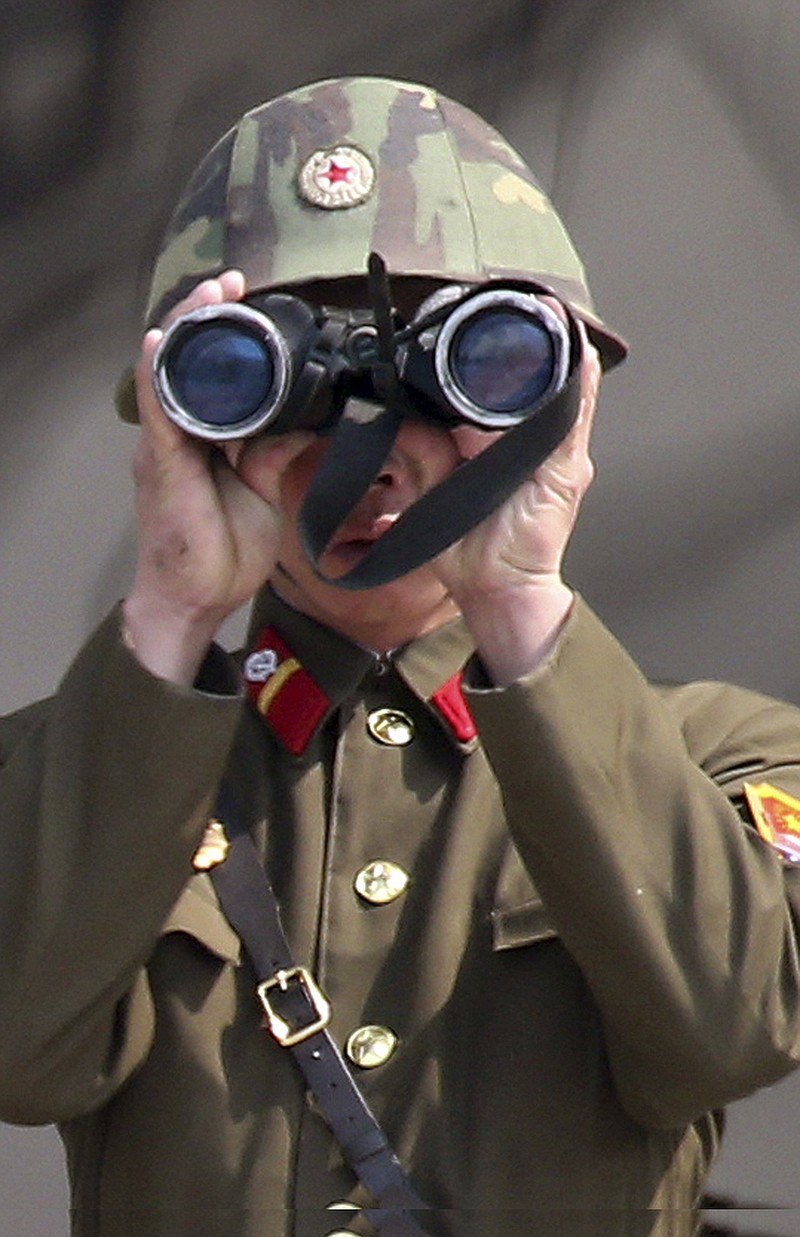SEOUL, South Korea (AP) - After a series of escalating threats, North Korea has moved a missile with "considerable range" to its east coast, South Korea's defense minister said Thursday. But he emphasized that the missile was not capable of reaching the United States and that there are no signs that the North is preparing for a full-scale conflict.
North Korea has been railing against U.S.-South Korean military exercises that began in March and are to continue until the end of this month. The allies insist the exercises in South Korea are routine, but the North calls them rehearsals for an invasion and says it needs nuclear weapons to defend itself. The North has also expressed anger over tightened U.N. sanctions for its February nuclear test.
Analysts say the ominous warnings in recent weeks are probably efforts to provoke softer policies from South Korea, to win diplomatic talks with Washington and solidify the image of young North Korean leader Kim Jong Un. Many of the threats come in the middle of the night in Asia - daytime for the U.S. audience.
The report of the movement of the missile came hours after North Korea's military warned that it has been authorized to attack the U.S. using "smaller, lighter and diversified" nuclear weapons. The reference to smaller weapons could be a claim that North Korea has improved its nuclear technology, or a bluff.
The North is not believed to have mastered the technology needed to miniaturize nuclear bombs enough to mount them on long-range missiles. Nor has it demonstrated that those missiles, if it has them at all, are accurate. It also could be years before the country completes the laborious process of creating enough weaponized fuel to back up its nuclear threats.
South Korean Defense Minister Kim Kwan-jin said he did not know the reasons behind the North's missile movement, and that it "could be for testing or drills."
He dismissed reports in Japanese media that the missile could be a KN-08, which is believed to be a long-range missile that if operable could hit the United States.
The Pentagon announced that it will hasten the deployment of a missile defense system to the U.S. Pacific territory of Guam to strengthen regional protection against a possible attack.
Experts say North Korea has not shown that it has accurate long-range missiles. Some suspect that an apparent long-range missile unveiled by the North at a parade last year was actually a mockup.
Kim, the South Korean defense minister, said that if North Korea were preparing for a full-scale conflict, there would be signs such as the mobilization of a number of units, including supply and rear troops, but South Korean military officials have found no such preparations.
"(North Korea's recent threats) are rhetorical threats. I believe the odds of a full-scale provocation are small," he said. But he added that North Korea might mount a small-scale provocation such as its 2010 shelling of a South Korean island, an attack that killed four people.
At times, North Korea has gone beyond rhetoric.
On Tuesday, it announced it would restart a plutonium reactor it had shut down in 2007. A U.S. research institute said Wednesday that satellite imagery shows that construction needed for the restart has already begun.
For a second day Thursday, North Korean border authorities denied entry to South Koreans who manage jointly run factories in the North Korean city of Kaesong. South Koreans already at the plant were being allowed to return home.
South Korea has prepared a military contingency plan should North Korea hold South Korean workers hostage in Kaesong, Defense Minister Kim said. He wouldn't elaborate.
Outraged over comments in the South about possible hostage-taking and a military response from Seoul, a North Korean government-run committee threatened to pull North Korean workers out of Kaesong as well.
The parading of U.S. air and naval power within view of the Korean peninsula - first a few long-range bombers, then stealth fighters, then ships - is as much about psychological war as real war. The U.S. wants to discourage North Korea's young leader from starting a fight that could escalate to renewed war with South Korea.
North Korea's military statement Thursday, from an unidentified spokesman from the General Bureau of the Korean People's Army, said its troops had been authorized to counter U.S. "aggression" with "powerful practical military counteractions," including nuclear weapons.
White House spokesman Jay Carney has called on Russia and China, two countries he said have influence on North Korea, to use that influence to persuade the North to change course.
On Thursday, Russian Foreign Ministry spokesman Alexander Lukashevich criticized a move by the North Korean parliament this week to declare the country in effect a nuclear weapons state.
"It's categorically unacceptable to see such defiant neglect by Pyongyang of U.N. Security Council resolutions and fundamental regulations in the area of non-proliferation of weapons of mass destruction," he said.
U.N. Secretary-General Ban Ki-moon also had sharp words for the North.
"Nuclear threat is not a game," Ban said Thursday in Madrid. "It's very serious and I think they have gone too far in the rhetoric. I am concerned that if by any misjudgment, by any miscalculation of the situation, a crisis happens in the Korean Peninsula. This really would have very serious implications."
South Korea's Defense Ministry said its military is ready to deal with any provocation by North Korea. "I can say we have no problem in crisis management," deputy ministry spokesman Wee Yong-sub told reporters.

